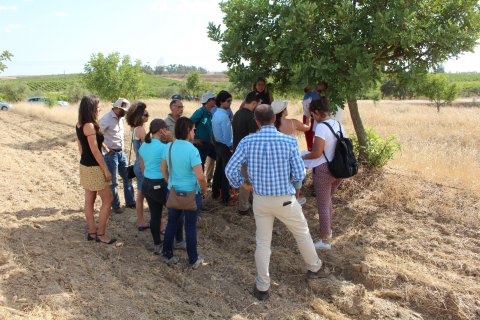Around 30 people attended the 3rd Portuguese RAIN meeting, which took place in EDIA’s headquarters in Beja, Portugal, on the 12th of September 2018.
As the event begun José Salema (EDIA) and Joana Amaral Paulo (ISA) welcomed the attendees. During his communication José Salema mentioned how important it is to search for management model alternatives that should also be environmentally-friendly and economically sustainable, for the Alqueva irrigation perimeter. Joana Amaral Paulo described the meeting’s goals and presented a communication on “Research and knowledge transfer for the promotion of sustainable agroforestry management models”. The meeting continued with the presentation by João Palma (ISA) on “The final list of innovations identified by the 9 AFINET project regions (Portugal, Spain, Italy, France, Belgium, Poland, Hungary, Finland, United Kingdom)”. During this presentation attendee were asked to participate in a game aiming to guess which country had identified each innovation. The person who better guessed won a gift basket that included, among other things, two books on riparian zone sustainable management and a set of the AgForward project innovation leaflets. The attendees were then requested to comment on the innovation list presented which lead to a debate among all the participants.
The remaining time of the meeting comprised three guest presentations: two from farmers and one from a researcher. Pedro Correia, a researcher with UAlg (Universidade do Algarve) spoke on “Carob cultivation and production”, and focused on the commercial and production features, the challenges brought by the sector, explaining the species vegetative cycle and particularities, its edaphic requirements and adaptability to silvopastoral management. Helena Manuel (from Herdade dos Lagos) presented “Herdade dos Lagos – an Agrosilvopastural way to sustainability”. She mentioned the latest history of the farm, acquired 35 years ago by the current owners, emphasizing their attention to ecological sustainability and protection of biodiversity. João Soares (from Herdade da Abegoaria) described the challenges he faces while maintaining sustainability and biodiversity on his farms, and implementing environmentally friendly agricultural practices to improve or at least maintain soil characteristics, increase production, decrease fertilization, etc., all in his presentation “Herdade da Abegoaria - the challenge of biodiversity”.
After a lunch break there was a field trip to Herdade dos Lagos, in Mértola. This farm is managed as an organic agricultural system. The visit focused on the silvopastoral carob orchard, where several questions were raised about carob tree planting, management and production. The relevance of the 1000 sheep present in the farm was evidenced in weed control, removal of tree suckers sparing the need for expensive labour and fertilize the soil. Attendees were very interested on the technical aspects of carob harvest, namely the usage of mechanical harvesting. Helena Manuel explained that, although there was a mechanical harvest trial at the farm made in previous years, it was chosen not to pursuit it since this practice caused an abundance of trunk wounds. Carob is currently manually harvested after the vineyard using the same work force. The trip proceeded to a mixed stand of carob tree and stone pine, where the benefit of sheep grazing was also noticeable. Here the technical aspects and restrains of investment support measures were discussed. This field trip ended with some wine tasting courtesy of Herdade dos Lagos.
The next Portuguese RAIN meeting will be happening in February 2019, on a date and location still to be decided.












